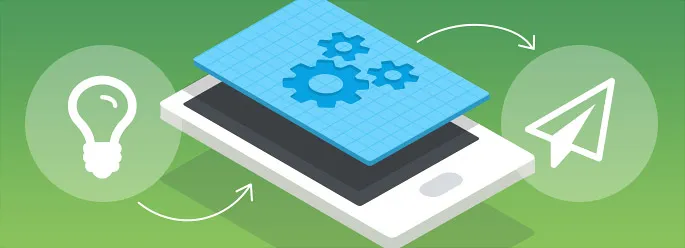
Mobile App Development: Beginner's Guide

Part One: Define Your Idea
Crafting a sophisticated commercial concept is the foundational step in the mobile app acquisition journey. Your vision must not only be innovative but also easily communicable to stakeholders, investors, and potential users. Take, for instance, the success story of Uber. Its revolutionary concept of on-demand transportation disrupted the traditional taxi industry by leveraging mobile technology. Similarly, Airbnb transformed the hospitality sector by offering a platform for individuals to rent out their homes, all through a mobile app.
Studying competitors is akin to conducting market research on steroids. Analyzing both triumphant and failed attempts within your industry provides invaluable insights into user preferences, pain points, and market trends. For instance, the rise of food delivery apps like DoorDash and Grubhub highlights the consumer demand for convenience and efficiency in meal ordering. Conversely, the demise of once-popular apps like Vine underscores the importance of continuous innovation and adaptation in the fast-paced digital landscape.
Understanding your audience is non-negotiable. Whether your target demographic comprises millennials, Gen Z, or baby boomers, diving deep into their preferences, behaviors, and needs is essential for crafting a user-centric app. Take the example of TikTok, which resonates strongly with Gen Z audiences through its short-form video content and interactive features. By aligning with user preferences and cultural trends, TikTok has amassed a loyal following and disrupted the social media landscape.
Choosing the right platform sets the stage for your app's success. Android boasts a larger user base globally, making it an attractive option for reaching a broad audience. Conversely, iOS users tend to spend more on in-app purchases, making it a lucrative platform for revenue generation. Consider the case of mobile gaming sensation Fortnite, which initially launched on iOS before expanding to Android and other platforms. This strategic approach allowed Fortnite to capitalize on iOS users' higher spending habits while still reaching a wide audience on Android.
Selecting a monetization strategy requires careful consideration of your app's value proposition and target audience. Freemium models, where the app is free to download but offers in-app purchases or subscriptions for premium features, have become increasingly prevalent. Look no further than popular apps like Spotify and LinkedIn, which offer free versions with optional premium upgrades. By offering a compelling free experience while enticing users with premium features, these apps strike a delicate balance between user acquisition and revenue generation.
Investing in analytics is akin to having a compass in uncharted waters. In today's hyper-competitive app market, data-driven insights are invaluable for refining your app's features, optimizing user experience, and maximizing ROI. Consider the case of Netflix, which leverages data analytics to personalize recommendations, enhance content discovery, and retain subscribers. By analyzing user behavior and preferences, Netflix continuously refines its app to deliver a tailored viewing experience, keeping users engaged and loyal.
Part Two: Engage with Developers
Identifying a reputable development company is akin to finding a trusted ally in your quest to bring your app to life. Look for developers with a proven track record of delivering high-quality apps within your industry or niche. For example, the development team behind the meditation app Headspace has garnered praise for its intuitive user interface, immersive content, and seamless performance.
Prioritizing experience ensures that your app is in capable hands. Seek developers with a deep understanding of mobile technologies, design principles, and user experience best practices. For instance, the team behind the fitness app Strava leverages its expertise in GPS tracking, social networking, and data visualization to create a seamless experience for runners, cyclists, and other athletes.
Ensuring a diverse skill set is essential for tackling the myriad challenges of mobile app development. Look for developers proficient in a range of technologies and frameworks, from front-end development languages like Swift and Kotlin to back-end systems like Node.js and Django. For instance, the team behind the productivity app Trello combines expertise in web development, cloud computing, and collaborative tools to deliver a versatile and user-friendly platform for task management and project collaboration.
Considering financial terms requires striking a balance between quality and affordability. While cost is certainly a factor, prioritizing quality and reliability can yield long-term benefits in terms of user satisfaction and app performance. For example, investing in a reputable development company like Fueled may require a higher upfront investment but can result in a polished, feature-rich app that resonates with users and drives business growth.
Emphasizing communication fosters collaboration and ensures that your vision is translated into reality. Choose a development company that values transparency, responsiveness, and proactive communication throughout the development process. For example, the team behind the language-learning app Duolingo maintains open channels of communication with clients, soliciting feedback, addressing concerns, and providing regular updates on project milestones.
Seeking organizational efficiency streamlines the development process and minimizes delays and misunderstandings. Look for developers experienced in agile methodologies, iterative development practices, and project management tools. For example, the team behind the project management app Asana leverages agile principles to prioritize tasks, track progress, and adapt to changing requirements in real time, ensuring that projects stay on schedule and within budget.
Prioritizing reliability ensures that your app remains secure, stable, and supported throughout its lifecycle. Choose developers who offer robust post-release support, maintenance, and updates to address bugs, security vulnerabilities, and evolving user needs. For example, the team behind the e-commerce platform Shopify provides ongoing technical support, performance monitoring, and platform updates to ensure that merchants can rely on their app to power their businesses effectively.





